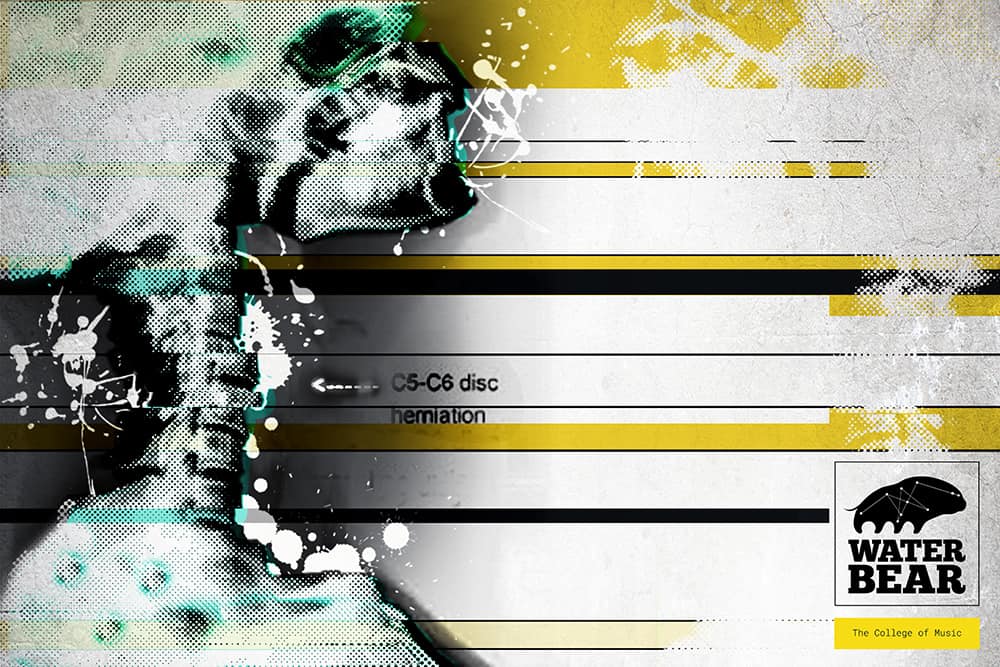
Blisters, calluses, headstock injuries and electric shocks. They don't tell you about all of this when you walk into the music store to buy your first guitar, all wide-eyed and hopeful, do they? However, if you’ve decided that music is your calling, does it put you off?
Music is a labour of love. We put an immense number of hours into practicing, music production and promotion but you don’t always reap the rewards straight away. So, you must ensure you are in it for the long run both physically and mentally.
Despite the positive impact music can have on us – guitars, basses, drums and even some forms of singing can take their toll on the body. They are not natural pursuits. Music is an invention. Instruments are man-made. And in some respects, they are out to get you.
Okay, maybe that’s a bit OTT. However, there are many an instrumental horror story - drummers who’ve had operations due to RSI rendering their wrists useless for 6 months, the overeager guitarist who broke their singer's jawbone with their headstock. And at its extreme; check out what happened to Curtis Mayfield.
For your pleasure, we’ve whipped around the college to find some horror stories, and lessons that will save you the pain.
'The worst injury I've sustained from playing the guitar is a prolapsed disc in my neck. It comes from years of headbanging night after night whilst being on stage. It was so bad that I remember being on tour with a neck brace. Despite this, I was still going on stage and headbanging night after night.
I really noticed this at 27 when the wear and tear finally gave way. Basically, you have disks in your neck, and when it bulges an inner disk pushes through and can cause weakness on an outer disk. This can press on nerves which, in my case, affected my left arm.
The damage got quite severe and recalibrated my pain threshold. My arm was so weak that I couldn't open a door. For ten years I couldn't really lift my arm over 90 degrees and suffered from pins and needles and numb fingers. Weirdly this did not affect my playing. I was, however, in chronic pain.
From this, I learnt that everything in life has a proper technique. Even headbanging like Angus Young has an appropriate method.
It was too late for me to go back and change years being on the road. However, I wanted to minimise any further problems. I enlisted the help of a professional that gave me tips for posture, which definitely helped my working life going forward.
If you are in a rock or metal band, this injury could be waiting for you, and my advice is to study 'headbanging technique'. Angus Young got away with it. However, there are many casualties on the road. Check the fluidity of your motion and try to understand your physiology. If, like me, you have long back and rigid skeleton – you are more prone to injuries.
Also, consider your instrument. For me, telecasters and acoustics really set it off however a Strat with that contour is no problem. Leo Fender, as ever, was way ahead of his time.
You must be mindful with what you eat on tour. A lousy food decision completely devastated me during a gig.
While on the road we often ate venue provided food, this is running the gauntlet. After one show, the food provided was questionable to say the least. Despite my gut feeling, I went ahead and ate it.
This turned out to be an awful decision, and the next day was spent throwing up. This negative effect of this was pressurised as the band was playing a sold-out 500 cap show that evening. I thought I could manage it, and so we played the gig.
Throughout the set, I fought waves of nausea, and I almost made it. I was about to rush away from the drumkit and say hello to the porcelain when the crowd & singer called for an encore. It was a terrible situation.
We started to play the encore, and I couldn't maintain. I vomited over my drumkit three times during the song. It was not pretty, especially as every time I hit the kit; I had an unfortunate reminder of last night's mistake. Despite how disgusting this was - it could have been much worse. I could have ended up in hospital.
In addition to being careful with what you eat, you need to be mindful of how you lift gear. I've seen too many injuries where musicians have misjudged the weight of their equipment. This always leads to pulled muscles and can even lead to permanent damage.
You need to protect the gig. It's easy to forget that while on the road, you are a performing asset. If you go down for any reason, it can mean pulling tours, losing money and at the worse lead to hospital trips. Tour casualties happen, and at their extremes can be fatal.
Be mindful of this, protect yourself, your band and your career.
It is crucial to maintain good vocal health, full stop. As a vocalist, our instrument is internal. Consequently, the way we treat our body has a direct impact on how we perform, sound and develop.
You need a proper breathing technique and daily practice. You need to be aware of any tensions in your body. Having a familiar knowledge of your unique instrument are just some of the ways that maintain a healthy and robust voice.
Vocalists are at risk of multiple injuries if good vocal practice isn’t followed. I’m sure you have heard of nodules, the damage that can affect the strongest of singers if vocal health is not maintained. Other potential risks are polyps, ulcers and one-sided paralysis. A strong vocal warm-up, daily practice and the continuing growth of knowledge of your instrument are the best ways to steer clear of any harm coming to your voice.
Having a mentor and vocal coach who you can check in with from time to time is also a great way to develop your skill but also have someone to feedback on how you are working and help to improve your techniques further.
Instruments are unwieldy beasts, whether it's a bass or an internal instrument like your voice. When we engage in the repeated activity of practice, it may not feel like it, but we are asking a lot from our body. Over time this repeated activity can lead to RSI, tendonitis and carpal tunnel syndrome.
If you want a career in music and as an instrumentalist, ‘economy of movement’ is a must. Ask yourself ‘what is the most natural way of achieving an unnatural thing?’
Luckily for you, many musicians have had the same struggle. Dr.Randall Kertz is a physician who specialises in injury prevention for musicians and bass players. You’ll also find a wealth of information on the Alexander Technique – check out this link for a comprehensive guide. This method will help you build good habits. Which in turn will help ensure a lifelong career in music.
If you interested in learning more and are serious about progressing in your career as a musician, Order a Prospectus or Apply Now.

- ‘Water bear’ is the common name for a Tardigrade.
- Tardigrades are micro creatures, found everywhere on earth.
- They are the most resilient creatures known.
- They can survive and adapt to their surroundings, even in outer space.
- Their resilience and ability to adapt and survive inspires us in everything we do. We love them.


WaterBear Education Ltd, Hanover House,
118 Queens Road, Brighton BN1 3XG, UK Map
Email: info@waterbear.org.uk
Tel: +44 (0) 1273 726230
WaterBear Sheffield, Unit 4, Gatecrasher,
49 Eyre Lane, Sheffield S1 4RB, UK
Email: infosheffield@waterbear.org.uk
Tel: +44 (0) 1143 992720

WaterBear Education Ltd, Hanover House,
118 Queens Road, Brighton BN1 3XG, UK Map
Email: info@waterbear.org.uk
Tel: +44 (0) 1273 726230
WaterBear Sheffield, Unit 4, Gatecrasher,
49 Eyre Lane, Sheffield S1 4RB, UK
Email: infosheffield@waterbear.org.uk
Tel: +44 (0) 1143 992720
- ‘Water bear’ is the common name for a Tardigrade.
- Tardigrades are micro creatures, found everywhere on earth.
- They are the most resilient creatures known.
- They can survive and adapt to their surroundings, even in outer space.
- Their resilience and ability to adapt and survive inspires us in everything we do. We love them.
